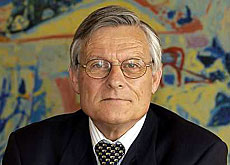Serbs question Kosovo adviser’s impartiality

Serbian President Boris Tadic has criticised the role of a Swiss expert at talks on Kosovo's future, questioning his independence from the Swiss government.
Thomas Fleiner, head of Fribourg University’s Federalism Institute, was asked by Belgrade in November to advise the team of Serb negotiators.
In an interview with the Belgrade-based weekly magazine Nin, Tadic indirectly questioned Fleiner’s independence, and whether his institute’s research is funded by public money.
The Serb leader said it would be reasonable to clarify the sources of the institute’s funding. Tadic criticised the Swiss government earlier this year for making a public statement in favour of a form of independence for Kosovo.
Belgrade, which says that the province must remain a part of Serbia, called on Switzerland at the time not to jeopardise its credentials as a neutral facilitator.
In a letter on Monday, Fleiner told the Tanjug news agency that he was prepared to give up his advisory role if his political and professional independence were questioned.
He added that those working for his institute were not under the Swiss government’s thumb, since their academic freedom was guaranteed by the constitution and canton Fribourg’s own legislation.
The institute received SFr1.865 million ($1.43 million) last year in mandates from the Swiss government, with another SFr780,000 from other sources. The cantonal university contributes SFr1.1 million.
Ties
Fleiner, a lawyer who has headed the institute since 1984, told swissinfo earlier that Serbia and Montenegro had approached him because of his knowledge of “federalist systems, multiculturalism and international law”.
He said his role would mainly be that of legal adviser to Belgrade’s negotiating team.
While he has refused to say whether the Swiss made a mistake by publicly endorsing the idea of an independent Kosovo even before the start of status talks, Fleiner has made it clear that continuing with the status quo is not an option.
The Serb media have pointed out in the past few days that besides the Swiss expert, Slobodan Samardzic – an adviser to Prime Minister Vojislav Kostunica – should also join the negotiating team. He is currently a guest professor at the federalism institute.
Fleiner has other ties to the Serb prime minister. His wife Lidija Basta, a legal expert who runs the institute’s international section, is an old family friend of Kostunica and his spouse.
Observers say the Swiss expert could simply be paying the price for the uneasy cohabitation between Tadic and Kostunica, who are opposed on a variety of issues.
The two men, who are bitter rivals, are both taking part in the Kosovo talks, which began officially on November 21.
Kosovo
Last month, Serbian lawmakers passed a resolution enabling the government to participate in negotiations, but at the same time made it clear that an independent Kosovo would be unacceptable.
The resolution says it “will proclaim any imposed solution illegitimate, illegal, and invalid” – a warning to the international community not to attempt to force the independence issue unilaterally.
Kostunica told parliament that a solution for Kosovo’s status must guarantee the preservation of Serbia and Montenegro’s sovereignty as well as essential autonomy for Kosovar Albanians.
Tadic has suggested splitting Kosovo into separate Serb and Albanian entities, along the lines of what was done in Bosnia-Herzegovina. But Kosovo’s Albanian leaders have rejected this solution outright.
swissinfo with agencies
Fleiner, an expert on federalism, multicultural states and international law, has been director of the Federalism Institute since 1984.
He has already worked in former Yugoslavia, including a stint as mission head for the Organization for Security and Co-operation in Europe from 1992 to 1993.
He also advised the Serb authorities when Serbia and Montenegro was created in 2003.
Kosovo, although its population is mainly Albanian, is still technically part of Serbia.
Since 1999, when Serb troops overran the province and Nato forced them out, Kosovo has been under UN administration.
There are major tensions between the Albanian majority and the Serb minority, which is protected by international peacekeepers.

In compliance with the JTI standards
More: SWI swissinfo.ch certified by the Journalism Trust Initiative











You can find an overview of ongoing debates with our journalists here . Please join us!
If you want to start a conversation about a topic raised in this article or want to report factual errors, email us at english@swissinfo.ch.